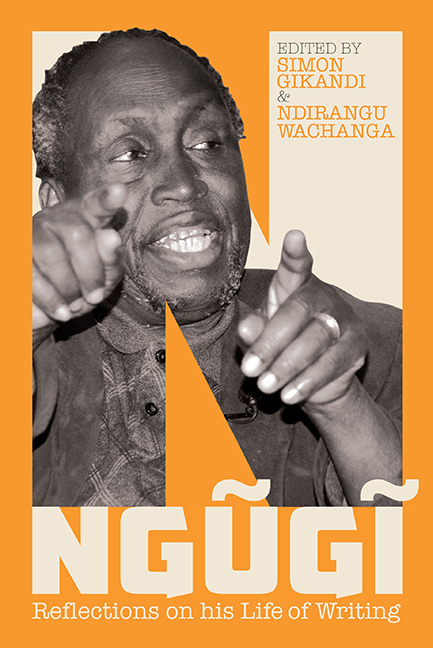Book contents
- Frontmatter
- Contents
- Preface
- Acknowledgements
- Chronology
- Photographic Section
- Introduction: Ngũgĩ wa Thiong'o: Reflections on His Life of Writing
- Ngũgĩ at Work
- Part I Serenades & Beginnings
- 1 Hyperbolic Praise Poetry for Ngũgĩ @80 … In Imitation of African Orature
- 2 A Song at Dawn (for Ngũgĩ wa Thiong'o)
- 3 Ngũgĩ in Eritrea
- 4 Up From Makerere: On the Publication of Weep Not, Child
- 5 Encountering Ngũgĩ at Leeds: An Interview with Peter Nazareth
- 6 The Book that Made Me: On Weep Not, Child
- 7 Note from a Literary Son
- 8 What is in a Name?
- 9 In Exile: Between Britain & Kenya
- Part II Memories, Recollections & Tributes
- Part III Working with Ngũgĩ
- Part IV The Writer, the Critic & the World
- Part V The Other Ngũgĩ
- Appendixes
- References
- Bibliography of Ngũgĩ's Primary Works
- Works Cited
- Notes on Contributors
- Index
7 - Note from a Literary Son
from Part I - Serenades & Beginnings
Published online by Cambridge University Press: 27 July 2019
- Frontmatter
- Contents
- Preface
- Acknowledgements
- Chronology
- Photographic Section
- Introduction: Ngũgĩ wa Thiong'o: Reflections on His Life of Writing
- Ngũgĩ at Work
- Part I Serenades & Beginnings
- 1 Hyperbolic Praise Poetry for Ngũgĩ @80 … In Imitation of African Orature
- 2 A Song at Dawn (for Ngũgĩ wa Thiong'o)
- 3 Ngũgĩ in Eritrea
- 4 Up From Makerere: On the Publication of Weep Not, Child
- 5 Encountering Ngũgĩ at Leeds: An Interview with Peter Nazareth
- 6 The Book that Made Me: On Weep Not, Child
- 7 Note from a Literary Son
- 8 What is in a Name?
- 9 In Exile: Between Britain & Kenya
- Part II Memories, Recollections & Tributes
- Part III Working with Ngũgĩ
- Part IV The Writer, the Critic & the World
- Part V The Other Ngũgĩ
- Appendixes
- References
- Bibliography of Ngũgĩ's Primary Works
- Works Cited
- Notes on Contributors
- Index
Summary
A waiter at a popular cafe in Irvine, California, narrated his encounters with an elderly customer. He came in regularly, the waiter recalled, usually on his own, and sat in a corner, under a heap of paper. Page after page, he ploughed through, reading out in a language the waiter did not understand, pausing to scribble before reading some more. The old man, the waiter concluded, was a refugee from some African country, and was learning English to enhance his chances of securing residency in America. So, in solidarity with a fellow African, the waiter ensured the old man's coffee bills were heavily discounted, always excluded gratuity.
One can imagine the waiter's chagrin when, months later, he came across a feature in a major American newspaper profiling his hermitic customer. The article said the elderly man was one of Africa's greatest living writers, and a distinguished professor of English at the University of California, Irvine. The waiter had merely encountered Ngũgĩ wa Thiong'o at work, probably polishing up novels that he usually writes in his first language, Gĩkũyũ.
Ngũgĩ means many things to different people. Like his fictional character, Matigari, whom Kenyan authorities sought to apprehend in the early 1980s, apparently because everyone was talking about him, he has been able to morph into larger-than-life forms. He was deified in Moi's Kenya, whispered about because his memory inspired suspicion from the authorities, who claimed he wanted to overthrow the government. Since writers bear pens, not guns, this vista of a revolutionary camouflaged as a writer inspired awe and dread.
Our first encounter was in 1986, when I joined high school. Our point of contact, his seminal novel, Weep Not, Child. The family feud re-enacted in the novel had Shakespearean echoes, for sure, but this was my story, talking about what elderly folks in my village called Mbara ya Imageneti. The Emergency War. And the characters in the novel bore names like mine and my classmates. For the next two decades, what sustained and buoyed my interest in the written word was the conviction that a Kenyan writer had written such a compelling story about his time. So, there was no reason for me not to make a similar attempt.
- Type
- Chapter
- Information
- NgugiReflections on his Life of Writing, pp. 51 - 52Publisher: Boydell & BrewerPrint publication year: 2018



